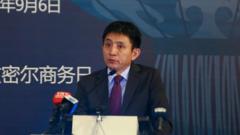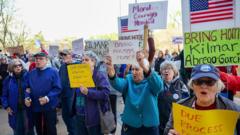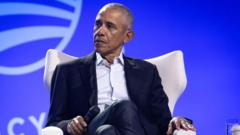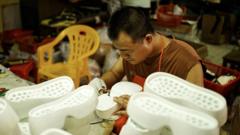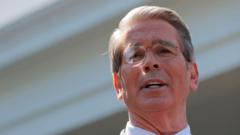El Salvador's President Nayib Bukele firmly rejected the return of Kilmar Armando Abrego Garcia, a deportee wrongfully sent to a Salvadoran prison, highlighting defiance against U.S. legal mandates and raising questions about diplomatic relations.
El Salvador's President Buckles Down on U.S. Deportee Controversy

El Salvador's President Buckles Down on U.S. Deportee Controversy
Nayib Bukele insists on not returning a wrongly deported man, igniting legal tensions with the Trump administration.
In a significant diplomatic confrontation, El Salvador’s President Nayib Bukele declared he would not return a wrongly deported U.S. man, Kilmar Armando Abrego Garcia, during a White House meeting with President Trump. Bukele's refusal emerged as he asserted that facilitating Garcia's return would be akin to smuggling “a terrorist into the United States.” The meeting took a dramatic turn as Trump, approvingly smiling during Bukele's remarks, reinforced the tension underlying the topic.
This ongoing deportation saga reflects a complex legal battle that escalated to the Supreme Court, which had previously mandated the Trump administration to “facilitate” Garcia's return due to the acknowledgment of an “administrative error” behind his deportation. However, the Trump administration has chosen to disregard this order, amplifying the divide between Washington and San Salvador.
In tandem, the Trump administration announced plans to freeze $2.2 billion in multiyear grants to Harvard over the university's refusal to comply with certain demands. This development coincides with potential new tariffs on imported computer chips and pharmaceuticals, propelling tensions further in the trade landscape.
In Europe, concerns are mounting regarding the impact of Trump's China tariffs, which threaten to flood the continent with cheap Chinese products, risking local industry viability. The British government, facing its own economic challenges, has rolled back some tariffs and introduced financing initiatives to bolster its exporters against these pressures. Furthermore, China’s recent countermeasures, aimed at limiting exports of critical minerals, may pose significant risks to U.S. military advancements.
The unfolding events portray a critical juncture in diplomatic and trade relations not just between the U.S. and El Salvador, but also in the global context as various countries navigate the repercussions of U.S. policies.


